![]()
The Words of the Zivna Family
|
|
The Words of the Zivna Family |
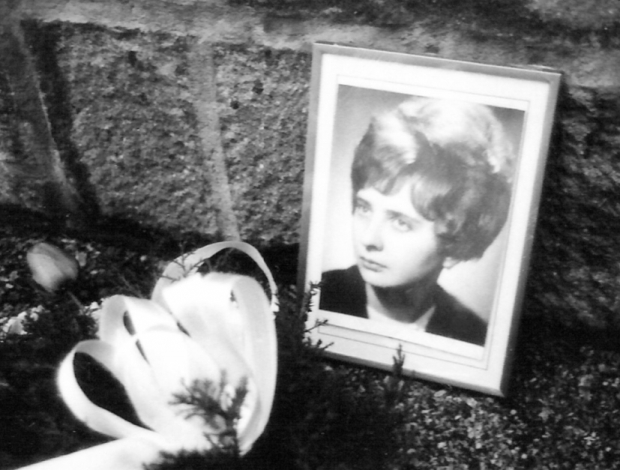
Exemplary
Piety, Marie Zivna, whom Father declared a martyr in 1994, on the
fortieth anniversary of the founding of the Unification Church
For Czechoslovakia, 1968 was very important. For several months, it seemed that the political oppression that the nation had been suffering under would come to an end. The political changes of the so called "Prague Spring" brought great hope to many people. Reforming communism and bringing peace and freedom to the nation seemed possible.
The church national leader of Germany, Paul Werner felt that this was a good time to send a missionary to Czechoslovakia. Emilie Steberl, the first missionary crossed the bonier on October 30, 1968, and came to Bratislava. She started a dangerous mission. How was she to witness and find new members? Under communism, our missionaries and members had to work carefully and secretly. Within a year Emilie could find twelve new members. In 1970 she had to leave Czechoslovakia because it had become too dangerous for her. At that time, the foundation for our movement was established and witnessing continued under the leadership of our Slovak sister Betka Daniskova. [Betka Daniskova joined in January 1969. While she led the church, they opened centers in eighteen cities and sent missionaries to other countries.]
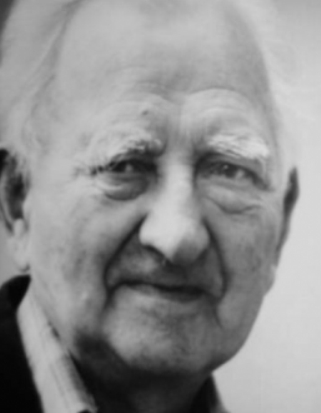
Marie
Zivna's father was never told what caused his daughter's death.
Marie Zivna was one of the first members of the Unification Church in Czechoslovakia -- she joined in 1972. She was a student of art at the university in the city of Brno. Michal Glonda, a brother who studied at the same university, invited Marie for a three-day seminar and explained the Divine Principle to her. Marie later mentioned that it was clear to her on the very first day that that this was the truth, but she did not say that until the seminar ended. Afterward she announced that she would join our church and started to work as a full-time member. She stopped studying, though she was in her final year and had been preparing for her thesis and final exams.
Marie was a very humble person and had a religious background. She had a good heart but did not speak much, being a bit introverted. She was always ready to help others. She had a sister and a brother; her parents lived near Brno at the Svojanov Castle. Her father worked as the caretaker and tour guide at the castle.
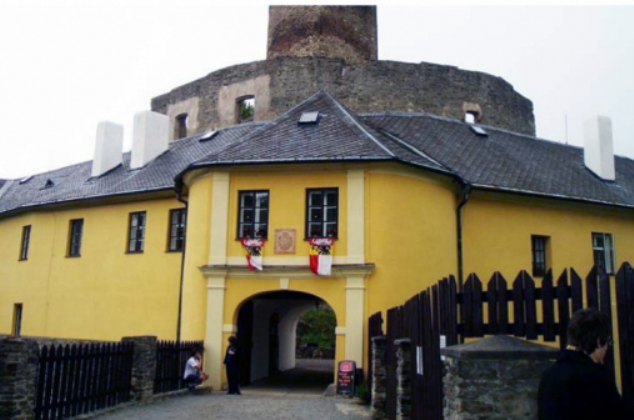
Svojanov
Castle, where Marie's father was the caretaker. The church held a
workshop there.
Very soon Marie became the assistant to the national leader Betka Daniskova. She led a very sacrificial life and protected Betka as much as she could. Marie was always taking care of the members; her smile could help solve many problems! In 1972, Marie organized a national meeting at Svojanov Castle -- more than thirty members came. Most of them were students, full of enthusiasm to change the world. This was the first national meeting in our country.
When Marie became the assistant to the national leader Betka Daniskova, it was a big help. She really could forget about herself and unconditionally support our leader. Her understanding of principle was very clear and connected with God.
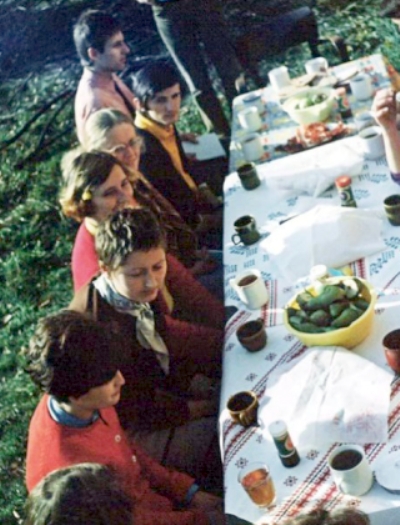
Lunch
during a 1973 workshop in Ostravice
On Christmas day, 1972, she had a very bad car accident. Four other sisters were with her in the car including Betka. That nobody died was a miracle. Marie suffered a light brain shock and lost consciousness. Betka's spinal cowl was severed, paralyzing het Marie was always thinking of her. During the entire period that Betka was in the hospital and afterward, Marie took care of her as if she were Betka's loving mother. She forgot about her own pain in order to care for Betka. Later, while in prison when she met Betka in the corridor by chance, Marie's first question was, "Do you have warm clothes, Betka?"
The communist secret police had been observing us since 1971. In September 1973, persecution of the Unification Church members began and members were arrested. Within several weeks almost thirty members were imprisoned. Marie was one of the last ones arrested. She worked silently and seemed to be invisible, so the secret police were not able to find her easily.
Being very close to our national leader, Betka, Marie knew many things, but Marie pretended to know nothing. She gave very little information, said nothing of importance, when the police interrogated her.
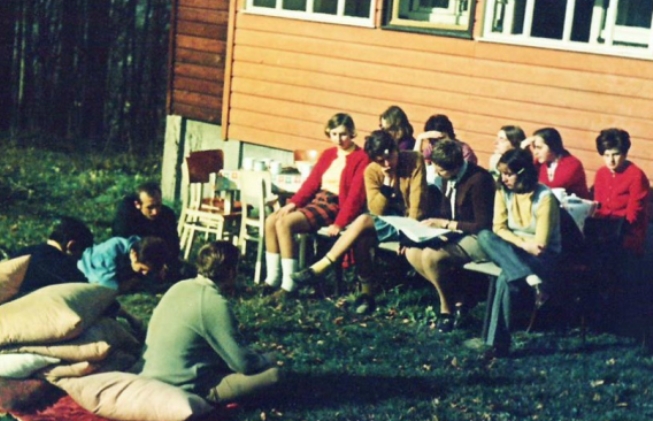
A
lecture in Ostravice, a popular resort area in what was then
Czechoslovakia
Marie was arrested in late autumn 1973. With other brothers and sisters she was awaiting trial in Bratislava Prison.
The trial began July 2, 1974 and lasted until July 19.
On Easter Thursday, April 16, 1974, Marie died under suspicious circumstances in prison. The prison police sent a telegram to her parents stating that their daughter was dead. They were shocked and immediately travelled to Bratislava to visit the prison. The police gave them her dead body in a copper coffin. The coffin was sealed and nobody was supposed to open it. Marie's parents did not obey the officials' instructions. They opened the coffin. What they saw was terrible -- there she lay with gray hair.
Her funeral was a big event in her home village. Marie had a very good reputation and people did not believe that she had lost her life accidentally. About a thousand people cane to her funeral, many expressing doubts about her death and accusing the communist regime of killing innocent people. Marie became a symbol of resistance against communism. Also at the funeral were numerous secret agents.
In 1976 a brother had a dream about Marie. She looked very nice and healthy and had a round face. There was another girl with her in the dream. Marie said, "Why do my parents think I am dead? I live, in reality."
In 1994 True Parents recognized Marie Zivna as a Unification Church martyr. She offered her life for the mission under very difficult circumstances.
Czechoslovakia was formed out of the remnants of the Austro-Hungarian Empire which was dissolved as a result of World War I. Some decades later, having annexed Austria, Adolph Hitler used Czechoslovakia as a stepping-stone to the invasion of Poland and his abortive conquest Of Europe. He began with a familiar ruse. Claiming that those in the large ethnic German minority group in the Sudetenland were being abused, he demanded the territory be given to Germany. To stave off war that might involve their own countries, Neville Chamberlain, the British prime minister; and Edouard Daladier, the French prime minister, flew to Germany to negotiate with Adolph Hitler and his ally Benito Mussolini. There, on September 29, 1938, they signed the Munich Pact, which dealt with one issue only. The pact held the signatories responsible to take the steps necessary to secure the cession of Sudetenland to Germany by Czechoslovakia.
In Prime Minister Chamberlain's own words, "When we were convinced... that nothing any longer would keep the Sudetenland within the Czechoslovakian state, we urged the Czech government as strongly as we could to agree to the cession of territory, and to agree promptly" The man that the two prime ministers convinced to cede the Sudetenland was President Edvard Benes.
Two days later, German troops marched into the Sudetenland. In March 1939, mechanized columns of Germany Army troops entered and occupied Prague. Shortly thereafter Hitler dissolved Czechoslovakia. His conquest of Europe had begun.
German occupation of Czechoslovakia ended when the Soviet Red Army, with some Czechoslovakian troops, reached Prague in May 1945. The following month, a government was reestablished under the prewar president, Edvard Benes. During the war; Benes had gone to Moscow and met Stalin. He admired some aspects of socialism in practice and was appalled by others. Following the war, communists held power in local government bodies and gradually encroached on the national level. Though sympathetic to socialism, Bales worked to resist the growing communist influence. Nevertheless, his radicalism lost him the moral and financial support of Western democratic powers. In elections to the Constitutional National Assembly in 1946, the Communist Party won 38 percent of the vote, more than any other party. Communist figures thus gained key government posts. Before elections could be held in 1948, the communists ousted Benes and took control, renaming the nation the Czechoslovak Socialist Republic. What followed was harsh Stalinist repression.
Twenty years later, in January 1968, Alexander Dubcek became head of the Communist Party of Czechoslovakia (CPCz) replacing an unpopular leader, Antonin Novotny, who had joined the CPCz soon after it was founded in 1921 and had been a key figure in deposing Edvard Benes in 1948.
Dubcek proceeded to reform the CPCz. In what he called a "unique experiment in democratic communism," he sought to liberalize many sectors of the government and society. Censorship was eased, and allowing political parties to compete against the CPCz was openly considered. Efforts were made to improve relations with the West. During this period, a few precious months, the people of Czechoslovakia experienced much greater freedom.
Dubcek's communist overlords were seriously threatened by this. Neighboring countries were jittery in fear that the sweet taste of freedom would compel their own citizens to rise in rebellion against the domination they were accustomed to being under. By August 18, the Soviet Union had decided to invade Czechoslovakia "even if it leads to a third world war." On August 20, "to come to the aid of the working class and... to defend socialist gains," an estimated half million troops from the Soviet Union, Poland, Hungary, Bulgaria, and East Germany invaded Czechoslovakia. Dubcek and other party leaders were spirited off to Moscow where they were coerced into signing a document renouncing some of the reforms and permitting Soviet troops to occupy Czechoslovakia. The occupation of Czechoslovakia would last two decades. Dubcek returned to Czechoslovakia. Eventually, he opened a locksmith shop in Bratislava.
Dubcek's replacement, Gustav Husak restored the frigid atmosphere that had preceded the liberalization efforts of Alexander Dubcek. The people's most poignant response to this was delivered by a nineteen year-old student Jan Palach, who died by self-immolation in Wenceslas Square in Prague as an act of protest on January 26, 1969.